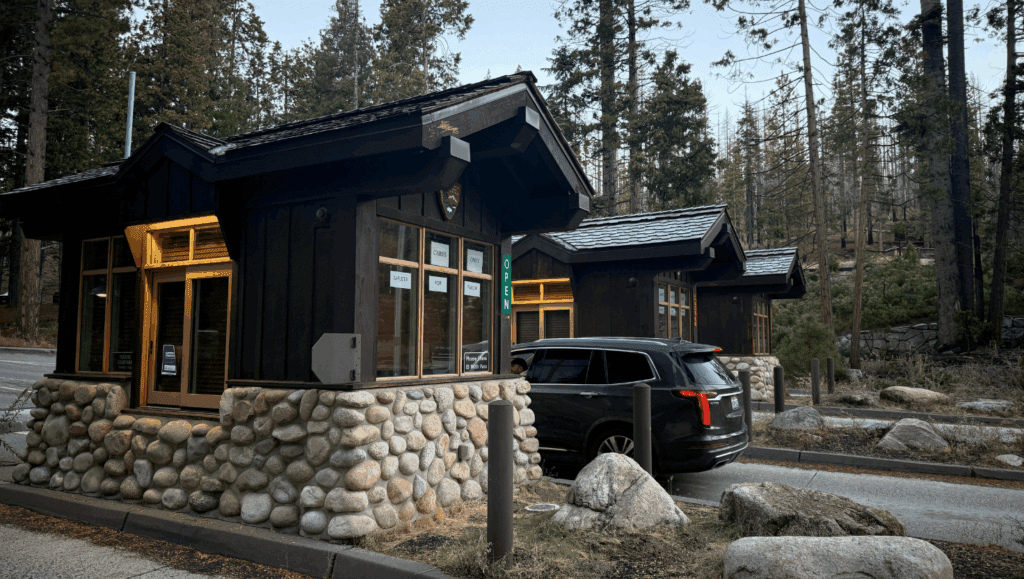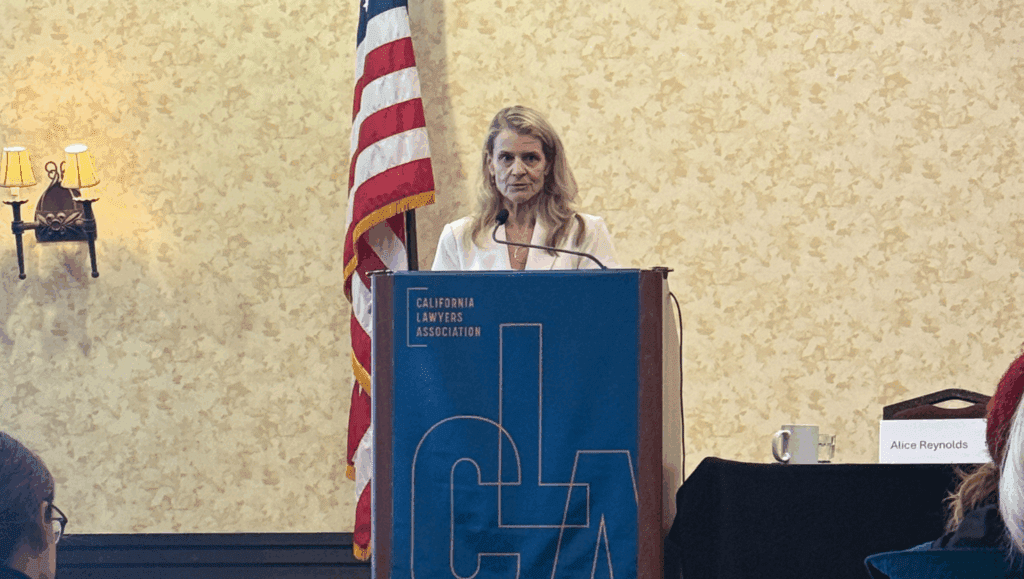Our National Parks are Open — and Openly Threatened
The Drain is a weekly roundup of environmental and climate news from Legal Planet.

“I’m still here working.” That’s what a park ranger at Yosemite National Park told me last Friday, as he made his rounds. Anyone who thinks they can flagrantly break the park rules during the government shutdown is in for “a rude awakening,” he said. Literally. He and other rangers have been using noise to wake up and disburse campers who put up tents where they’re not allowed.
Yosemite is very much open for business. I was staying at a cabin in the park last week while attending the annual Yosemite Environmental Law Conference with UCLA colleagues and about 40 of our environmental law students.
Is Yosemite OK? It is, for now. The park entrance is open for cars to drive through with no staff operating the booth to collect fees. A small blue poster taped to the booth’s window reads “Support Yosemite” and offers a QR code for visitors to donate the value of their entrance fee. I did not see people stopping to donate. But while standing outside the park entrance one morning, I did see a car filled with international visitors drive up and stop at the ticket booth. They were trying to make sense of the message about the shutdown notice. “Is anybody here?” they asked me. “Is the park open?” Welcome to America.
Videos inside the park have shown squatters and BASE jumping. There have been reports of illicit camping and hiking, but that’s not what I saw. The ranger I talked to (who didn’t want to be named) said that the first two weeks were indeed “chaotic” but that the staff has taken steps to institute order. Trash is being collected, partly thanks to the climber volunteers behind Yosemite Facelift, and restrooms are open. That’s important because more than 4 million people visit Yosemite National Park each year, leaving behind plastic bags, coffee cups, and soiled toilet paper.
If Yosemite is relatively managed, for now, it’s despite the Trump administration. Individual parks around the country have had to fend for themselves and try to keep visitors informed about what’s open and closed, and what level of service to expect when they arrive. During Trump’s last government shutdown in 2018, some asshole took a chainsaw to living Joshua Trees. This year, Trump’s Interior Secretary Doug Burgum has tried to take a chainsaw to the staffing, funding, and morale of our National Parks. The staffing has already been cut by about one-fourth. Now, Interior wants to “imminently” fire at least another 2,000 employees across the agency, Anna Kramer reports for NOTUS — about 3% of its workforce. That would include 272 people working at the National Park Service — botanists, archeologists, regional managers who support parks, including Yosemite — the agency revealed in a Monday legal filing. A federal judge last week granted a temporary restraining order to halt federal layoffs.
The ranger I saw at the trailhead for the magnificent Mariposa Grove hiking trails was the only one making the rounds that afternoon. He said he believes he will be paid after the shutdown ends. But the nearby tent where National Park staff might normally be answering visitors’ questions had collapsed in on itself, proving that a picture is worth a thousand words: The federal government has folded up its tent and gone home.

This is The Drain, a weekly roundup of environmental and climate news from Legal Planet. This week’s song is “California Stars” by Wilco and Billy Bragg, covering Woody Guthrie. Here’s what else is happening…
Fear and Lawyering in Yosemite
As for the 4-day Yosemite conference hosted by the California Lawyers Association, it’s a who’s who of the environmental law scene. Now in its 34th year, the conference featured more than 25 panel discussions on topics ranging from AI regulations to transmission permitting to legal developments around both NEPA and CEQA to the future of environmental justice.
As you’d expect, California’s path forward in the face of federal hostility was front and center. “It has never been more important, and it has never been more tested,” California Secretary for Environmental Protection Yana Garcia said during her opening remarks. One panel titled “Putting Up a Fight” outlined current and future environmental litigation against the second Trump administration, featuring lawyers on the front lines. Other plenary speakers included former White House climate advisor Gina McCarthy and CPUC President Alice Reynolds.

Reynolds defined the challenge ahead for California’s energy system this way:
“We need to upgrade and add to an existing massive, complex infrastructure system that can meet all of our needs in a very diverse state while we develop clean energy generation that can play the role of natural gas plants so that we can swap them out, while wildfire and other climate risks are increasing every year, and knowing that essentially 100% of the revenue stream to repay any capital spent to fund this transition, whether public or private, is essentially in electricity bills.”
She went on to explain how California plans to meet its goals on this front.
My Emmett Institute colleague Cara Horowitz moderated a panel titled “Uplifting State and Local Government Opportunities” with Adrian Martinez, Winter King, and Christine Hironaka, all about how cities, air districts, and state governments are trying new things to cut pollution and reach climate goals. The Emmett Institute’s Julia Stein moderated the “No Way to Recycle Our Way Out of Plastic Pollution” panel about how to confront the firehose of single-use plastics — as well as the growing danger of microplastics — with Stacy Lau, Dave Edwards, and Robin Stafford. Stein also helped organize a “Resilient Rebuilding” panel with LA County Supervisor Lindsey Horvath, Cecilia V. Estolano, Josh Lappen, and Abre’ Conner. Their discussion focused on pre-planning now for how to recover from the next climate-fueled disasters.
California
Phillips 66 and Kinder Morgan this week proposed a pipeline switcheroo: a Western Gateway Pipeline to carry gasoline, jet fuel and diesel from St. Louis to Southern California. Noah Baustin at Politico reports that this pipeline reversal “would be the first pipeline — ever — to carry gasoline into the Golden State, eliminating its status as a fuel island, which has long defined its price dynamics.” Sure it could reduce international exports but it’s like investing in a new vape pen when you need to quit smoking altogether.
The California Energy Commission has authorized $42.75 million in grants for offshore wind port development, in what commission staff described as the first appropriation of the state’s Climate Bond funds for offshore wind, writes Emma Penrod for Utility Dive.
Gov. Gavin Newsom recently vetoed a bill that would have tracked the growing water footprint of proliferating data centers in California. Ian James reports for the LAT that the bill was opposed by business groups including the Data Center Coalition. He’s got a good rundown of other water legislation too.
Newsom also vetoed the bill to phase out nasty “forever chemicals” used in some nonstick cookware. He said he worried it would make pots and pans more expensive. My non-PFAs Lodge cast iron skillet was less than $50 and has lasted 10 years. Just saying.
California hiring officials have created a website and information sessions specifically targeted at former federal workers for 3,000 job postings across all agencies and counties. Camile Von Kaenel has a roundup of California agencies that have scooped up federal workers. It’s at Politico’s California Climate newsletter.
California’s FAIR plan, the insurer of last resort, is seeking a big 36% average rate hike following the $4 billion or loss from recent fires. Should Big Oil help pay? “It’s not fair that California homeowners have to continually pay more for home insurance while the companies that caused the problem and lied about it keep raking in profits,” says Center for Climate Integrity’s Iyla Shornstein.
Public transit riders in the San Francisco Bay Area (as well as Chicago and Philadelphia) are staring down budget crises, with deep service cuts not far behind, Heatmap reports. “BART now projects that its COVID relief funding will be gone by spring of next year, after which it will face a deficit of $350 million to $400 million per year.”
David Wallace-Wells writes about why holdover fires, like the one that became the Palisades fire, add another complication in an era of global warming. “What holdover fires teach us more than anything else is that the ignition doesn’t matter nearly as much as the buildup of fuel does.”
And a Polluters Pay Youth Walkout is planned for this Friday in support of the Polluters Pay Climate Superfund Act, a California legislative proposal to hold oil companies liable for climate damages that stalled in Sacramento this past session.
UN and COP30 in Brazil
Global deforestation has not slowed in any significant way since 127 countries pledged 4 years ago to reverse forest loss and degradation by 2030, reports Alexander Villegas for Reuters.
But fires — including wildfires worsened by climate-fueled drought — were the leading cause of forest loss, “accounting for 6.73 million of those hectares around the world, with the Amazon rainforest hit particularly hard.”
Still, the newly published 2025 Forest Declaration Assessment shows that nations are 63% off track from meeting their zero-deforestation target. The good news is that restoration efforts are expanding, with at least 10.6 million hectares hosting forest restoration projects worldwide.
“It is in everybody’s interest to protect the forest,” Frances Seymour told Sachi Kitajima Mulkey at the New York Times. “But nobody gets paid for protecting a forest.” Last month, a coalition of 34 governments released a plan for financing forest conservation and Brazil announced it would invest $1 billion into the Tropical Forests Forever Facility.
Planet-warming carbon dioxide levels jumped by the highest amount on record last year, the World Meteorological Organization says. CO2 levels soared to a level not seen in human civilization and “turbo-charging” the Earth’s climate and causing more extreme weather, the United Nations weather agency said last week in a bulletin.
A digital feature from UNDP tells the story of a group of Indigenous women who call themselves “Guerreiras da Floresta,” or Forest Warriors. “Living mainly in Maranhão, the Guajajara have long balanced farming, hunting and strong spiritual ties to the forest. Today, many of their women step into public leadership, advocacy and environmental education, blending ancestral ecological knowledge with modern tools to defend their land and culture.”
Members of the International Maritime Organization postponed a major vote on the world’s first truly global carbon pricing scheme, tanked by Trump. The decision “casts uncertainty over the future of the Net-Zero Framework, which would have been the world’s first binding emissions target for an entire industry,” Canary Media reports.
Climate Politics
Last week, I wrote about how little of the recent wildfire coverage mentioned climate change. This week, Kate Yoder at Grist looks at new polling to explain why Democrats have stopped talking about “climate change” instead favoring cheap energy. “There’s no obvious electoral upside in being really smart on energy and climate policy,” Sean Casten, an Illinois Democrat and longtime climate champion, told Yoder. Another Grist article analyzes the strategic use of the phrase “Green New Scam” in official documents, saying the slogan may sound like a joke, but it’s part of a broader campaign to undermine public trust in climate action.
Virginia Democrats are on a “The Energy Bills are Too Damn High” tour of the state ahead of the gubernatorial election. “It was promoted as a way to allow community members to hear from Democratic elected officials and candidates about how they want to address rising utility bills in coming legislative sessions,” Virginia Mercury reports.
A new article in The Journal of Climate Change and Health makes the case that federal climate policy and health policy are seen as mostly separate, but are becoming more integrated.
“We need every electron we can get,” says Republican Utah Sen. John Curtis when asked about the cancellation of $7.5 billion in clean energy projects.
Yesterday, the Senate’s bipartisan version of the Fix Our Forests Act advanced through the Senate Committee on Agriculture, Nutrition, and Forestry, setting up for a vote by the full Senate. The bill is co-sponsored by Sen. Alex Padilla and supported by other Democrats.
Courts and Litigation
California AG Rob Bonta, alongside the California Public Utilities Commission, just joined a multistate coalition in suing to block the EPA’s termination of the $7 billion Solar for All Program. That’s a lawsuit filed last week in federal court in Rhode Island by nearly two dozen states and other partners. The Rhode Island AFL-CIO, which trained workers to install solar panels following a $49.3 million grant, accuses the EPA of illegally revoking the grants without congressional approval. NYT’s Maxine Joselow goes deep on how cutting solar grants in red states has even hurt Trump Country.
A Superior Court judge ruled that Sable Offshore Corp., the Texas oil company trying to restart a previously ruptured oil pipeline near Santa Barbara, did large-scale work without the required permits. The ruling means no more work and that the company has to shell out the &18 Coastal Commission fine, Edhat reports.
How safe are the courts for climate victories, with a conservative SCOTUS? Miranda Green explored that in a recent newsletter called “Can the Courtroom Save the Climate?”
Speaking of which, more than 100 House Republicans are supporting Big Oil’s call for the U.S. Supreme Court to intervene in Boulder’s case. Their amicus brief tries to argue that the city of Boulder aims to control national energy policy.
Our Children’s Trust recently saw a case tossed by a judge in Montana, but that judge also said the plaintiffs had successfully argued that climate change constitutes a “children’s health emergency.”
More Trump administration

Besides layoffs, there are also temporary furloughs, and EPA has sent its largest round of furlough notices yet to employees, according to E&E News.
And then there’s the revolving door: Kyle Kunkler was the top lobbyist for America’s soybean industry but now he is the Trump administration’s top official in charge of pesticide policy at EPA, Hiroko Tabuchi reports for NYT.
The Federal Reserve and the Federal Deposit Insurance Corporation last week said the Biden-era policy of banks planning for climate risks was superfluous. The change could cost the U.S. economy in the years ahead.
Lindsey Halligan — the top prosecutor in the Eastern District of Virginia — started texting and texting and texting Anna Bower, senior editor at Lawfare, about a criminal case she is pursuing against New York Attorney General Letitia James and she never said the 2-day text thread was “off the record” except after the fact. Which is not a thing.
Energy
“Too slow” is not how I’d describe the Energy Department’s recent moves, but reporting from Politico suggests that Energy Secretary Chris Wright has been too deliberative and too interested in consulting industry players before canceling contracts for the Trump White House. Ten sources say relations have clearly soured between Trump’s inner circle and Wright.
The US Energy Department has finalized a $1.6 billion loan guarantee to American Electric Power to rebuild some 5,000 miles of transmission lines across five Midwestern states.
A recent paper from Lawrence Berkeley National Laboratory looks at trends in retail electricity rates from 2019 to 2024. “Across the country, the researchers found correlations with increased utility distribution and transmission spending and rising rates,” Blanca Begert reports for Inside Climate News.
A bill on New York Gov. Kathy Hochul’s desk would end subsidies for gas line extensions. Assembly Bill 8888 seeks to end the “100-foot rule” requiring utilities to connect new customers to a gas line for free, based on their distance to an existing gas main.
Kate Crawford, a researcher who has tracked the environmental effects of A.I. for years, collaborated on an Opinion video published by the New York Times based on visits to a town that is essential to the A.I. industry, Spruce Pine, N.C., which was pummeled by Hurricane Helene last year.
China wants to fuel the EU with wind power: Chinese turbine manufacturer Ming Yang announced this month that it plans to invest $2 billion in a factory in Scotland, Matthew Zeitlin reports for Heatmap News. “The facility is scheduled to start production in late 2028, churning out offshore wind equipment for use in the UK, which has over 15 gigawatts of offshore wind capacity, as well as for export, likely in Europe.”
And developer US Wind told a federal court that it will go bankrupt if Trump succeeds in revoking its building permits for its 2.2-gigawatt Maryland Offshore Wind project, Alexander Kaufman reports at Heatmap.
Emissions and Interventions
A Quebec-based developer of carbon removal projects called Deep Sky just got a $40 million grant commitment from the Bill Gates-backed fund Breakthrough Energy Catalyst, Axios reports.
Big Tech is betting big on a questionable form of carbon removal known as bioenergy with carbon capture and storage. So-called “BECCS” also includes biomass-fueled power plants, waste incinerators, and biofuel refineries that add carbon capturing equipment to their facilities. James Temple at MIT Technology Review writes that “experts have raised a number of concerns about various approaches to BECCS.”
EPA’s plan to stop regulating tailpipe emissions has states surveying their options for regulating pollution within their borders, E&E News reports. My Emmett Institute colleague Ann Carlson says vehicle standards are the most effective way to bring Southern California in compliance with federal ozone standards.
Media News

Sammy Roth, former LAT climate columnist, launched his new venture after leaving the paper and his Boiling Point column. “Climate-Colored Goggles” is a new Substack newsletter from Roth about “climate and culture: to encourage America’s most influential storytellers to get in the game.” His first installment is a scoop about the entertainment industry’s biggest sustainability group cutting ties with Toyota for its part in blocking climate action.
Boiling Point, the LA Times newsletter about climate and the environment in the West, is continuing on without Roth. Last week, Noah Haggerty staffed the newsletter and says that water, climate, and environmental reporters will all be contributing each week.
Longtime LAT housing reporter Liam Dillon is now at Politico where he’ll continue reporting on rebuilding Los Angeles and housing issues across California.
ProPublica — a newsroom that’s won eight Pulitzer Prizes — announced last week that it is joining the Covering Climate Now consortium, “as part of a sustained commitment at ProPublica to telling the climate story.”
Chris Anderson, the man who made TED Talks a household name is branching out to climate action: Anderson’s new venture is a combined new fund, coalition and convening called All Aboard, reports Axios. Think private TED conference for climate investors.
More than 1,500 people from 49 communities were forced from their homes as a result of that unusual and wildly destructive Typhoon Halong earlier this month. I think it’s fair to say the story was under-covered by American media and highlights the extreme importance of public media in places like Alaska, which has 27 struggling public radio stations.







Reader Comments